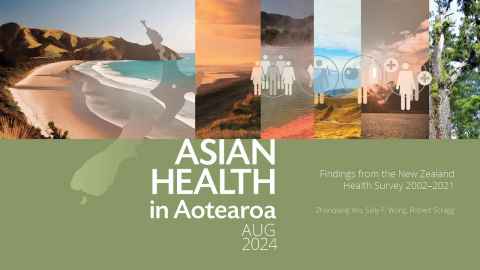Obesity doubles in Asian communities
28 August 2024
The rate of Asians who are obese has doubled in the past 20 years and racism has persisted over that time, according to a sweeping new report.

Obesity has doubled among Asian New Zealanders over the past 20 years, just one of many startling facts revealed in a sweeping new report on Asian health.
The report, Asian Health in Aotearoa, commissioned by community health service The Asian Network Incorporated, will be launched in Parliament on 27 August at 6pm.
“The report is the most comprehensive yet,” says Vishal Rishi, director of The Asian Network Incorporated. “It sheds lights on a number of critical issues that require attention to improve Asian health outcomes.
“We are very concerned about the increase in discrimination and ethnically motivated attacks, poor access to primary health care, and poorer outcomes around physical activity and nutrition” says Rishi.
The report draws on 20 years of nationally representative data from the government’s New Zealand Health Survey to report on the health of three ethnic communities: South Asian, Chinese and Other Asian.
The prevalence of obesity in adults across all three Asian groups has doubled, from 26 percent in 2002-03 to 53 percent in 2019-21 surveys, a finding which surprised lead author Zhenqiang Wu of Waipapa Taumata Rau, University of Auckland.

“Usually, because of ‘the healthy migrant effect’ [where younger, better educated people migrate], you would consider them to be a reasonably healthy group. But, when you have a look at obesity, it's much higher than for the ‘European and Other’ group,” Wu says.
The research also showed Asian adults, along with Māori and Pacific adults, were less physically active than other groups.
In all three Asian groups, along with Māori and Pacific, children and adults were less likely to eat the recommended five-plus servings of fruit and vegetables per day.
The proportion of each Asian ethnic group consuming fast food more than once per week has increased since 2006-07.
“This is concerning,” says senior author Professor Robert Scragg of the University of Auckland, “because obesity is associated with chronic diseases, such as heart disease and diabetes.”
Another significant finding was persistently higher prevalence of ethnic discrimination, with no significant improvement over the past ten years.
Chinese adults (41.2%) were the most likely of all ethnic groups to have ever been a victim of an ethnically motivated verbal attack, followed by Māori (29.6%), South Asian (23.8%), and Other Asian (23.2%), compared to European and Other (13.9%).

There was an increase in the proportion of ethnically motivated attacks among Chinese adults, from 27.3 percent in 2015–16 to 41.2 percent in 2020–21.
All Asian groups, along with Māori and Pacific, were more than twice as likely as European and Other groups to be treated unfairly when renting or buying a house because of their ethnicity.
Another finding is Asian adults were less likely to have a usual health practitioner and less likely to visit a hospital when they were unwell.
Access to health services was higher among those who had lived in New Zealand for more than ten years, or who were born in New Zealand.
Encouraging findings include low proportion of smoking and comparatively low proportion of harmful alcohol use among Asian populations.
These findings are important, says Wu, because Asians are the fastest growing ethnicity in New Zealand.
In the 2002-03 survey, Asians made up six percent of the adult population while, in the 2023 Census, Asian people were estimated at 17 percent of the New Zealand population. It is predicted that Asian people will make up 26 percent of the population in 2043.
As this group continues to grow, so will its health needs, says Wu. Therefore, more research is needed that provides more nuanced insights into various Asian communities.
“In most research, Asians are treated as one single, homogeneous group, but ‘Asians’ can be from many countries and are very diverse in culture, religions and many other factors,” Wu says.
“That diversity usually leads to different health needs and health status. So, we really need some more research to respond to the needs of those diverse groups over time.”
The report was commissioned by The Asian Network Incorporated, but the research was designed independently.
“Our communities have so much to offer Aotearoa, but we are still experiencing significant inequities in health outcomes,” Rishi says.
“Our approach to Asian healthcare needs careful planning and resourcing to effectively meet the needs of our beautiful, diverse Asian communities here in Aotearoa.”
Media contact
FMHS media adviser Jodi Yeats
M: 027 202 6372
E: jodi.yeats@auckland.ac.nz